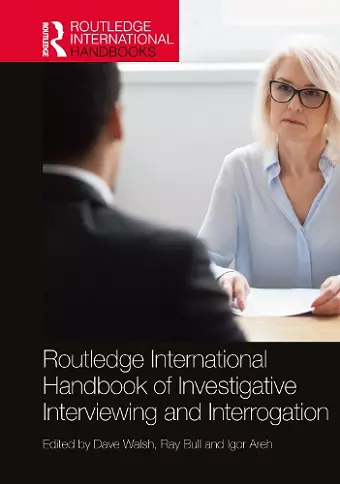Routledge International Handbook of Investigative Interviewing and Interrogation
Dave Walsh editor Ray Bull editor Igor Areh editor
Format:Hardback
Publisher:Taylor & Francis Ltd
Published:9th Aug '24
Currently unavailable, and unfortunately no date known when it will be back

This handbook provides readers with coverage of the various interview and interrogation techniques used across the world with victims, witnesses, and suspected offenders. It includes exclusive coverage on countries rarely, if ever, previously reported upon in the literature to any substantive depth.
Bringing together a collection of chapters from over 40 countries, this handbook advises and explains the practices used in crime interviewing and informs the reader of contemporary developments hitherto unreported in any current book on interviewing and interrogation. In doing so, the Routledge International Handbook of Investigative Interviewing and Interrogation showcases global exemplars of evidence-based practice informed by scientific research. Building on recent research, including protocols developed in a variety of countries, this book is particularly timely in the wake of the "Méndez Principles", a set of principles developed by the UN (i) to counter the ill-treatment of suspects during police questioning and (ii) to gather more reliable information.
This handbook will be an essential reference text across criminology, criminal justice, policing and investigation studies, and law.
"As a long-term researcher and trainer of investigative interviewing—specifically on rapport-based approaches with suspects, I fully support this book. Its global focus on methods that are ethical and, critically, based on sound theory and empirical evidence is both timely and welcome. It is unique in its global reach and will doubtless be a stand-out text for academics, policy makers, and trainers alike".
Laurence Alison, Professor of Psychology, The University of Liverpool
"Investigative interviewing is a critical aspect of intelligence gathering and criminal investigations, with varying practices across different countries, jurisdictions and police cultures. From the coercive interrogation methods of the past to the more humane and rapport-based approaches of today, the evolution of investigative interviewing has been significant. This book provides a comprehensive overview of investigative interviewing techniques in over 40 different countries, shedding light on the diverse legal systems, traditions and cultures that shape these practices. By bringing together international experts, this book offers valuable insights that can help improve investigative interviewing practices on a global scale, making it an essential resource for law enforcement professionals, researchers, and policymakers".
Ivar Fahsing,Chief Superintendent,Norwegian Police and Associate Professor at the Norwegian Police University College
"This volume provides an indispensable contribution to the need for international standards on investigative interviews in investigations. Its main merit is the extensive empirical study of how interrogation actually works in more than 40 countries studied. Justice is ill-served by coercive and hostile interrogation tactics that cut corners to get either confessions or declarations against interest, while it is still believed that in many countries the presumption of innocence and the exclusionary rule are systematically violated in criminal and other investigations, it is also rewarding that, as the book shows, there are also signs of optimism that many countries are progressing towards more ethical means of interviewing suspects, victims, and witnesses. Nevertheless, more work is needed and the book also shows the path to more—and more urgent—research, and lends support to the initiative to develop universal standards for non-coercive investigative interviews".
Juan E. Mendez, Professor of Human Rights Law in Residence, Washington College of Law and Former UN Special Rapporteur on Torture (2010–2016)
ISBN: 9781032543505
Dimensions: unknown
Weight: 453g
510 pages